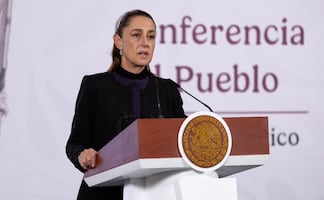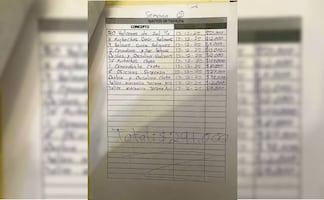Más Información

Narco “La Rana”, entre altar a la muerte, corridos de Los Rayos del Norte, drogas y armas doradas; EU difunde foto de como vivía

Sheinbaum ajusta horario de conferencia mañanera este 26 de febrero; se realizará desde Mazatlán, Sinaloa

Ellos son “La Rana” y “Aquiles”, hermanos Arzate-García, jefes del Cártel de Sinaloa; EU los busca por narcoterrorismo
China
on Tuesday approved a contentious national security law for Hong Kong that takes direct aim at some of the actions of anti-government protesters last year , in a move many see as Beijing’s boldest yet to erase the legal firewall between the semi-autonomous territory and the mainland’s authoritarian Communist Party system .
Details of the law remained under wraps until it was published and took effect immediately.
The text specifies that those who destroy government facilities and utilities would be considered subversive . Damaging public transportation facilities and arson would constitute acts of terrorism . Any person taking part in secessionist activities , whether organizing or participating, will violate the law regardless of whether violence is used.
Recommended: Hong Kong pushes bill allowing extraditions to China
The law took effect ahead an hour before July 1 , the 23rd anniversary of the territory’s passing from Britain to China . Amid protests in Hong Kong last year, demonstrators broke into the legislative building on the anniversary, spray painted slogans on the walls and heavily damaged the electronic voting system.
President Xi Jinping
signed a presidential order promulgating the law after its approval by the Standing Committee of the National People’s Congress, the official Xinhua News Agency said. It was to be added to the Basic Law , Hong Kong’s constitution .
Under the law, those found guilty of inciting secessionist , subversive , terrorist activities and colluding with foreign forces could face life imprisonment if they are deemed masterminds of such activities.
The legislation also states that Hong Kong’s government “shall take necessary measures to strengthen publicity, guidance, supervision and management” for schools, social groups, media, internet, and other matters related to national security.
Recommended: Hong Kong riots: the “one country, two systems” principle is in deep crisis
Hong Kong
will establish a committee responsible for maintaining national security in the city. It will be chaired by chief executive Carrie Lam and will be accountable to and supervised by the Chinese government .
Passage of the law came amid fears in Hong Kong and abroad that it would be used to curb opposition voices in the financial hub. The U.S. has already begun moves to end special trade terms given to Hong Kong after the former British colony was returned to China in 1997 .
Speaking in a video message to the U.N. Human Rights Council in Geneva , Lam said the law would “only target an extremely small minority” of lawbreakers , would not be retroactive, and that mainland legal bodies would only have jurisdiction in “rare, specified situations.”
Critics say it is the most significant erosion to date of Hong Kong’s British-style rule of law and the high degree of autonomy that Beijing promised Hong Kong would enjoy at least through 2047 under a “ one country, two systems ” framework.
Recommended: China approves controversial national security legislation for Hong Kong
Hong Kong pro-democracy activists Joshua Wong
, Agnes Chow , and Nathan Law issued statements on Facebook saying they would withdraw from their organization Demosisto , which then announced that it would disband with the loss of its top members.
Wong said “worrying about life and safety” has become a real issue and nobody will be able to predict the repercussions of the law , whether it is being extradited to China or facing long jail terms .
A group of about 30 pro-China supporters gathered at Hong Kong’s Tamar Park on Tuesday, waving Chinese flags. Organizers said that the rally was to show support of the national security law , and to celebrate Hong Kong’s return to China .
Meanwhile, more than 100 protesters gathered at a luxury mall in Hong Kong’s Central business district , chanting slogans including “ Free Hong Kong, Revolution Now ,” with several holding a flag representing an independent Hong Kong as well as posters condemning the law.
On Wednesday, Hong Kong police made the first arrests as thousands of people defied tear gas and pepper pellets to protest against the contentious move on the anniversary of the former British colony’s handover to Chinese rule .
Police said 10 people were arrested including a man with a Hong Kong independence flag and a woman holding a sign displaying the British flag and calling for Hong Kong’s independence —all violations of the law that took effect Tuesday night. Others were detained for possessing items advocating independence.
Hong Kong police
said on Facebook that they arrested some 370 people on various charges, including unlawful assembly , possession of weapons , and violating the new law , which was imposed in a move seen as Beijing’s boldest step yet to erase the legal firewall between the semi-autonomous territory and the mainland’s authoritarian Communist Party system.
Concerns also were expressed in Taiwan , which Beijing claims as its own territory to be brought under its control by force if necessary.
The self-governing island recently said it would consider providing asylum for Hong Kong opposition figures who fear arrest.
Taiwan
on Wednesday opened an office to facilitate migration from Hong Kong .
Drafting of the law took place amid intense secrecy , with even top Hong Kong officials reportedly not given advance notice of its specifics.
Questions linger over the effects on Hong Kong’s free press that has come under increasing political and financial pressure, as well as the operations of nongovernmental organizations, particularly those with foreign connections.
The law’s passage comes after Hong Kong’s legislature in early June approved a contentious bill making it illegal to insult the Chinese national anthem. Pro-China figures have also been pushing for more “patriotic” education to be introduced into the curriculum in hopes that will boost their identification with Beijing .
sg
Noticias según tus intereses
[Publicidad]
[Publicidad]











